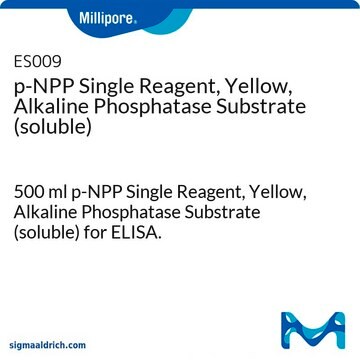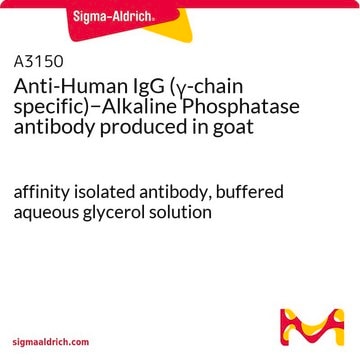N9389
4-Nitrophenyl phosphate disodium salt hexahydrate
chromogenic, tablet
Synonym(s):
p-Nitrophenyl phosphate disodium hexahydrate, Disodium 4-nitrophenyl phosphate hexahydrate, di-Sodium 4-nitrophenyl phosphate, pNPP disodium hexahydrate
About This Item
Recommended Products
product name
4-Nitrophenyl phosphate disodium salt hexahydrate, tablet
description
5 mg substrate per tablet
form
tablet
fluorescence
λex 310 nm (pH 7.1)
λex 399 nm (Reaction Product)
storage temp.
−20°C
SMILES string
O.O.O.O.O.O.[Na+].[Na+].[O-][N+](=O)c1ccc(OP([O-])([O-])=O)cc1
InChI
1S/C6H6NO6P.2Na.6H2O/c8-7(9)5-1-3-6(4-2-5)13-14(10,11)12;;;;;;;;/h1-4H,(H2,10,11,12);;;6*1H2/q;2*+1;;;;;;/p-2
InChI key
KAKKHKRHCKCAGH-UHFFFAOYSA-L
Looking for similar products? Visit Product Comparison Guide
Related Categories
General description
Application
- enzyme-linked immunosorbent assay (ELISA) to visualize glycoprotein VI (GPVI) binding to collagen type I (Col I)
- enzymatic color reaction for semi-quantitative measurement of allergen-specific IgE by ELISA
- alkaline phosphatase assay
Storage Class Code
11 - Combustible Solids
WGK
WGK 3
Flash Point(F)
Not applicable
Flash Point(C)
Not applicable
Personal Protective Equipment
Certificates of Analysis (COA)
Search for Certificates of Analysis (COA) by entering the products Lot/Batch Number. Lot and Batch Numbers can be found on a product’s label following the words ‘Lot’ or ‘Batch’.
Already Own This Product?
Find documentation for the products that you have recently purchased in the Document Library.
Customers Also Viewed
Articles
NBT-BCIP substrate system aids in western blotting and immunohistological staining, producing a blue-purple insoluble end product.
Our team of scientists has experience in all areas of research including Life Science, Material Science, Chemical Synthesis, Chromatography, Analytical and many others.
Contact Technical Service






